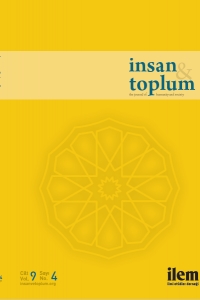Abstract
Psikoloji ve psikolog sözcükleri hangi anlamlara gelmektedir? Bu sözcüklerin günlük dilde kullanımını ve anlam(lar)ını ortaya çıkartmayı hedefleyen bu çalışma, sosyal medya verisini İlk Örnek Teorisi ve Derlem Anlam Bilim yaklaşımlarıyla çözümlemektedir. Eylül 2017-Ocak 2019 arasında Twitter’dan elde edilen veri psikoloji için birbirinden farklı 25.492 mesajda 451.346 sözcük, psikolog için 15.651 mesajda 279.762 sözcükten oluşmaktadır. Bulgular, psikoloji sözcüğünün bağlantılı olduğu üst kategoriler arasında sıklık sırasıyla nitelik, nicelik, meslek, eğitim, zihin, kişi ve inancın yer aldığını göstermektedir. Psikolog sözcüğü ise nitelik, nicelik, eğitim, kişi, meslek, unvan ve yer üst kategorileri ile bağlantılıdır. Bu üst kategorilerin yanı sıra hem psikoloji hem de psikolog ile eş uyum (X ve Y: Psikoloji ve felsefe, psikolog ve psikiyatrist gibi) kalıbı anlamlı bir şekilde kullanılırken psikolog ile ayrıca tanımlama (X bir Y: Psikolog bir arkadaş gibi) ve benzetme (X gibi: Psikolog gibi konuşmak gibi) kalıpları kullanılmaktadır. Ayrıca her iki sözcük de “psikoloji falan kalmadı”, “psikolog olmak istiyorum” gibi çeşitli çok sözcüklü birimlerde anlamlı bir şekilde sıklıkla gözlemlenmiştir. Sonuç olarak bu sözcüklerin sözlüklerde ve alandaki tanımları ile günlük dilde kullanımı tam örtüşmemektedir. Sözlük ve alandaki tanımların güncellenmesi ve psikologların sosyal medyayı daha aktif bir şekilde kullanmaları önerilmektedir.
Keywords
References
- Aksan, M. ve Aksan, Y. (2018). Patterns and frequency: Evidence from the Turkish national corpus (TNC). M. A.
- Akıncı ve K. Yağmur (Drl.). The rouen meeting: Studies on Turkic structures and language contacts içinde. Wiesbaden: Harrassowitz Verlag.
- Aksan, Y., Aksan, M., Mersinli, Ü. ve Demirhan, U. U. (2017). A frequency dictionary of Turkish: A core vocabulary for learners. London: Routledge.
- Anthony, L. (2018). AntConc (Version 3.5.7) [Computer Software]. Tokyo, Japan: Waseda University. http://www. laurenceanthony.net/software.
- Arik, E. ve Arik, B. T. (2019). Büyük veri ve derlem anlam bilim açısından aşk kavramı: Anlam, gönderim ve metafor. Psikoloji Çalışmaları. Online first.
Abstract
What do the terms “psychology” and “psychologist” mean? Using the prototype theory and corpus semantics, this study aims to reveal the meanings of these words in everyday language. The data were collected from Twitter between September 2017 and January 2019. A total of 25,492 tweets contained the term “psychology.” These tweets consisted of 451,346 words. A total of 15,651 tweets contained the term “psychologist.” These tweets consisted of 279,762 words. The results showed that the term “psychology” was related to the following categories, ordered according to their frequency: QUALITY, QUANTITY, OCCUPATION, EDUCATION, MIND, PERSON, and BELIEF. Meanwhile, the term “psychologist” was related to QUALITY, QUANTITY, EDUCATION, PERSON, OCCUPATION, and JOB-TITLE. Moreover, both the terms “psychology” and “psychologist” had the coordination construction (X and Y: psychology and philosophy, psychologist and psychiatrist). The term “psychologist” also had the description construction (X is Y: a psychologist friend) and the likening construction (X as Y: speaking like a psychologist). Furthermore, these words were used significantly more frequently in n-grams such as psychology no more [meaning demoralized] and I want to be a psychologist. As a result, the meanings of these words do not completely overlap those in the dictionaries and in the profession. Therefore, the dictionary entries and the professional definitions should be improved and academics and professionals should use social media more actively.
Keywords
References
- Aksan, M. ve Aksan, Y. (2018). Patterns and frequency: Evidence from the Turkish national corpus (TNC). M. A.
- Akıncı ve K. Yağmur (Drl.). The rouen meeting: Studies on Turkic structures and language contacts içinde. Wiesbaden: Harrassowitz Verlag.
- Aksan, Y., Aksan, M., Mersinli, Ü. ve Demirhan, U. U. (2017). A frequency dictionary of Turkish: A core vocabulary for learners. London: Routledge.
- Anthony, L. (2018). AntConc (Version 3.5.7) [Computer Software]. Tokyo, Japan: Waseda University. http://www. laurenceanthony.net/software.
- Arik, E. ve Arik, B. T. (2019). Büyük veri ve derlem anlam bilim açısından aşk kavramı: Anlam, gönderim ve metafor. Psikoloji Çalışmaları. Online first.
Details
| Primary Language | Turkish |
|---|---|
| Subjects | Psychology |
| Journal Section | Research Articles |
| Authors | |
| Publication Date | December 21, 2019 |
| Published in Issue | Year 2019 Volume: 9 Issue: 4 |

